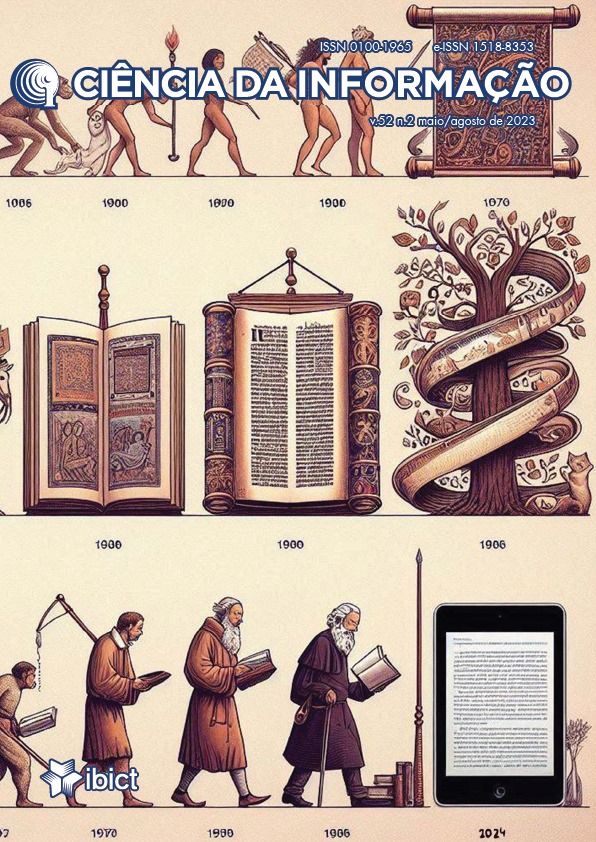Transparency of COVID-19 information: a comparisonof open data transparency dashboards
DOI:
https://doi.org/10.18225/ci.inf.v52i2.7077Palavras-chave:
dashboards, transparency, open government data (OGD), COVID-19Resumo
This paper aims to analyze the transparency features of COVID-19 dashboard created by Brazil, Germany, The Netherlands, and, United Kingdom governments. These dashboards are webpages that present data in different format, such as text, maps, graphs and tables, and can reduce information asymmetry between the government and people. This paper relies on a combination of varied literature to build a Dashboard Transparency Evaluation Framework: Open Government Data, websites transparency assessment, dashboard functionalities and information flowchart, and collaborative stakeholder participation in open government processes. Based on an exploratory approach this paper adopted the structured search and evaluation method to investigate and evaluate the dashboards portals. This paper concludes that data are shown in different formats in all countries and with different functionalities and thus can help people follow the evolution of the disease and also the policy decision. However there is room to improve ransparency, such as the integration of dashboards with open data policies and access to information or the interoperability with legacy systems. Future research can advance in the analysis of the users demand, articulation between stakeholders, state technological capacity among others.
Downloads
Referências
ABREU, W. M. D.; GOMES, R. C. Medindo o nível da influência colaborativa dos stakeholders e das ações de orçamento aberto. Revista de Administração Pública, Rio de Janeiro, v. 52, n. 4, p. 593-609, 2018.
ALBANO, C. S.; REINHARD, N. Desafios para governos e sociedade no ecossistema brasileiro de dados governamentais abertos (DGA). Cadernos Gestão Pública e Cidadania, São Paulo, v. 20, n. 67, p. 214-234, jul./dez. 2015. DOI: 10.12660/cgpc.v20n67.41150. Disponible en: https://periodicos.fgv.br/cgpc/article/view/41150. Acceso en: 23 nov. 2023.
CORREA, A. S.; SOUZA, R. M.; SILVA, F. S. C. Towards an automated method to assess data portals in the deep web. Government Information Quarterly, [s. l.], v. 36, n. 3, p. 412-426, 2019.
DINIZ, V. Como conseguir dados governamentais abertos. In: CONGRESSO CONSAD DE GESTÃO PÚBLICA, 3., 2010, Brasília. Anais [...]. Brasília: Consad, 2010. p. 4-18.
FREITAS, R. K. V. D.; CARDOSO, A. L. R. Inovação aberta na gestão pública: análise do plano de ação brasileiro para a Open Government Partnership. Revista de Administração Pública, [s. l.], v. 48, n. 4, p. 869-888, 2014.
GREGÓRIO FILHO, A. S.; AGUNE, R. M.; BOLLIGER, S. P. Governo Aberto SP: disponibilização de bases de dados e informações em formato aberto. In: CONGRESSO CONSAD DE GESTÃO PÚBLICA, 3., 2010, Brasília. Anais [...]. Brasília: Consad, 2010. p. 4-35.
MATHEUS, R.; JANSSEN, M. Transparency of civil society websites: towards a model for evaluation websites transparency. In: Proceedings of the 7th International Conference on Theory and Practice of Electronic Governance, 7., 2013, Seoul. Anais […]. Coreia: ICEGOV, 2013.
MATHEUS, R.; JANSSEN, M.; MAHESHWARI, D. Data science empowering the public: Data-driven dashboards for transparent and accountable decision-making in smart cities. Government Information Quarterly. Government Information Quarterly, [s. l.], v. 37, n. 101284, p. 1-9, 2018.
MATHEUS, R.; RIBEIRO, M. M.; VAZ, J. C. Strategies and instruments for the dissemination and promotion of open government data use in Brazil: case study of Rio de Janeiro city hall. Tecnologia e Sociedade, Curitiba, v. 14, n. 33, p. 172-189, jul./set. 2018.
MOREIRA, O.; RICCIO, E. L.; SAKATA, M. C. G. A comunicação de informações nas instituições públicas e privadas: o caso XBRL-eXtensible Business Reporting Language no Brasil. Revista de Administração Pública, Rio de Janeiro, v. 41, n. 4, p. 769-784, jul./ago. 2007.
PEDROSO, L.; TANAKA, A.; CAPPELLI, C. A Lei de Acesso à Informação brasileira e os desafios tecnológicos dos dados abertos governamentais. In: SIMPÓSIO BRASILEIRO DE SISTEMAS DE INFORMAÇÃO (SBSI), 9., 2013, João Pessoa. Anais [...]. Porto Alegre: Sociedade Brasileira de Computação, 2013. p. 523-528. DOI: https://doi.org/10.5753/sbsi.2013.5718.
REMUZZI, A.; REMUZZI, G. COVID-19 and Italy: what next? The Lancet, [s. l.], v. 395, n. 10231, p. 1225-1228, abr. 2020.
SEGUNDO, J. E. S. Web semântica, dados ligados e dados abertos: uma visão dos desafios do Brasil frente às iniciativas internacionais. In: ENCONTRO NACIONAL DE PESQUISA EM PÓS-GRADUAÇÃO EM CIÊNCIA DA INFORMAÇÃO (ENANCIB), 16., 2015, João Pessoa. Anais […]. João Pessoa: UFPB, 2015.
STEBBINS, R. A. Exploratory research in the social sciences. California: Sage Publications, 2001. 80 p.
VIANA, G. B.; TOLEDO. M. B. F. An evaluation of Brazilian Transparency Portal and how to improve it. In: International Conference on Information Society (i-Society), 2011, London. Conferência […]. London: IEEE, 2011. p. 366-372. DOI: 10.1109/i-Society18435.2011.5978471.
Downloads
Publicado
Edição
Seção
Licença
Copyright (c) 2024 José Carlos Vaz, Hironobu Sano, Ricardo Matheus

Este trabalho está licenciado sob uma licença Creative Commons Attribution-ShareAlike 4.0 International License.
- A publicação se reserva o direito de efetuar, nos originais, alterações de ordem normativa, ortográfica e gramatical, com vistas a manter o padrão culto da língua, respeitando, porém, o estilo dos autores;
- As provas finais não serão enviadas aos autores;
- Os autores mantém os direitos totais sobre seus trabalhos publicados na revista Ciência da Informação, ficando sua reimpressão total ou parcial, depósito ou republicação sujeita à indicação de primeira publicação na revista, por meio da Licença Pública 4.0 Internacional Atribuição-CompartilharIgual
- Deve ser consignada a fonte de publicação original;
- As opiniões emitidas pelos autores dos artigos são de sua exclusiva responsabilidade;
- Cada autor receberá dois exemplares da revista, caso esteja disponível no formato impresso.





























